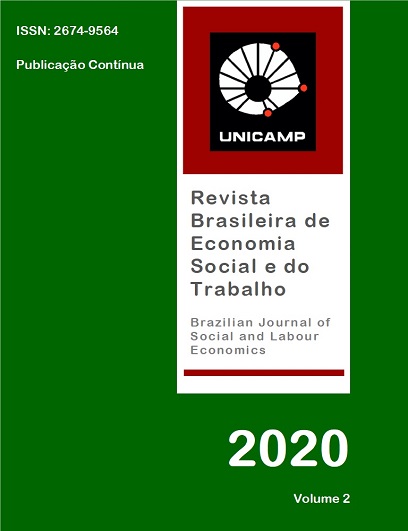Resumen
Este artículo examina la situación y las características estructurales del mercado de trabajo coreano desde la crisis financiera global en 2008. Aunque el mercado de trabajo coreano haya sido resiliente después de esta crisis, hay aspectos que requieren atención, incluyendo la elevada desigualdad de los rendimientos, una fuerza de trabajo envejecida, el aumento de empleos atípicos y el aumento de las tasas de desempleo juvenil. La fuerza de trabajo coreana se dividió, no solamente por el tipo de empleo, sino también por el tamaño de las empresas (grandes corporaciones y Pymes). Por lo tanto, el principal problema del empleo se origina básicamente en la profundización de la estructura dual en el mercado de trabajo. Este artículo presenta una breve caracterización del mercado de trabajo en Corea del Sur analizando detalladamente los principales indicadores del empleo. Analiza también las diferencias salariales y las condiciones de trabajo por el tipo de empleo y el tamaño de la empresa, enfocado en el mercado de trabajo dual. Así mismo, examina la situación actual del trabajo en plataformas digitales, que emergió como un área importante del mercado de trabajo, y la tendencia del salario mínimo, que fluctuó en los últimos dos años
Citas
Berg, J., Furrer, M., Harmon, E., Rani, U., & Silberman, M. S. (2018). Digital labour platforms and the future of work: Towards decent work in the online world. Geneva: International Labour Organization. Retrieved from: https://www.ilo.org/global/publications/books/WCMS_645337/lang--en/index.htm
Center for Labor Trends Analysis. (2019). 2018 Wage Trends and Wage Outlook for 2019. [KLI Working Paper 2019-04], Korea Labor Institute, Sejong. Retrieved from: https://www.kli.re.kr/kli_eng/selectBbsNttList.do?key=220&bbsNo=31&nttNo=133565&searchY=&searchCtgry=&searchDplcCtgry=&searchCnd=SJ&searchKrwd=(WorkingPaper2019-04)2018WageTrendsandWageOutlookfor2019&pageIndex=1&integrDeptCode=
Chang, Jiyeun. (2017). Diversification of employment types and labor market inequality. [KLI Employment & Labor Brief, Issue 69], Korea Labor Institute, Seul. Available at: https://www.kli.re.kr/kli_eng/engPdicalView.do?key=440&pblctListNo=8806&schPdicalKnd=4&schPblcateDe=&mainPageUnit=10&searchCnd=all&searchKrwd=&mainPageIndex=6
Chang, Min. (2019). How the dual structure of labor market affect youth employment in Korea. [KIF Vip Report, 2019(9), 1-60], Korea Institute of Finance, Seul. Available at: https://www.kif.re.kr/kif3/eng/publication/pub_detail?&mid=210&nid=951&vid=6050&cno=263893
Cheon, Byung-you. (2018). Structure and implications of Korea’s labor market segmentation. Labor Review, Korea Labor Institute (KLI), 21-35.
Florisson, Rebecca, & Mandl, Irene (2018). Platform work: Types and implication for work and employment – Literature review. [Working Paper WPEF18004], Eurofound, Dublin. Retrieved from: https://www.eurofound.europa.eu/sites/default/files/wpef18004.pdf
Grubb, D., Lee, J. K., & Tergeist, P. (2007). Addressing labour market duality in Korea. [OECD Social, Employment and Migration Working Papers No. 61], Organisation for Economic Co-operation and Development, Paris. Retrieved from: http://www.oecd.org/korea/39451179.pdf
Hue, Ik-soo. (2007). Changes in the legal system over the 20 years of the 1987 Regime and Democratic Law: Labor market flexibility and labor law changes since 1987. Democratic Legal Studies, 35, 81-111.
Hwang, Deok-soon. (2016). Diversification of digital business types and employment types. 28th Anniversary Seminar on Technology Change and the Future of Labor, Korea Labor Institute (KLI).
Hwang, Ki-don. (2017). Digitization and labor policy. KZFW, 35(3), 37-56.
Hwang, Sook-yeong. (2009). Diagnosis of economic and employment crisis. Labor Review, Korea Labor Institute (KLI), 3-11.
ILO (2011). Equality at work: The continuing challenge. Global report under the follow-up to the ILO Declaration on Fundamental Principles and Rights at Work. International Labour Conference, 100th session, Geneva. [Report of the Director General]. Retrieved from: https://www.ilo.org/declaration/info/publications/eliminationofdiscrimination/WCMS_166583/lang--en/index.htm
Jang, Keunho. (2018). Characteristics and problems of the employment structure in Korea. [Working Papers 2018-34], Economic Research Institute, Bank of Korea, Seul. Available at: https://ideas.repec.org/p/bok/wpaper/1834.html
Jeon, Byung-you, Hwang, In Do, & Park, Kwangyong (2018). Labor market duality in Korea and policy responses. [Working Papers 2018-40], Economic Research Institute, Bank of Korea, Seul. Available at: https://ideas.repec.org/p/bok/wpaper/1840.html
Jeong, Jun-ho, Cheon, Byung-you, & Chang, Ji-yeun. (2017). Factoring changes in wage inequality: 2006-2015. Korean Journal of Labor Studies, 23(2), 47-77.
Jung, Heung‐jun. (2019). A new approach to estimating the number of workers in special employment. KLI Employment & Labor Brief, 88(2019-03). Korea Labor Institution (KLI). Available at: https://www.kli.re.kr/kli_eng/engPdicalView.do?key=440&pblctListNo=9131&schPdicalKnd=4&schPblcateDe=&mainPageUnit=10&searchCnd=all&searchKrwd=&mainPageIndex=1
Keum, Jae-ho. (2018). Major changes in the labor market after the foreign exchange crisis in the Korean labor and income panel study. 2018 KLIPS Conference. Korea Labor Institute (KLI), Seoul National University.
Kim, Seong-hyuk. (2019). New atypical labor in the digital platform. Non-Regular Labor (Bi-Monthly), 136, 40-45.
Kim, Yoo-bin, Lee, Young-mon. (2018). Statistics and survey findings on youth employment and labor. [Labor Market & Employment Policies, 2018-6], Korea Labor Institution (KLI), Seul. Available at: https://www.kli.re.kr/kli_eng/engRsrchReprtView.do?key=382&pblctListNo=9222&schPblcateDe=&mainPageUnit=10&searchCnd=dataNm&searchKrwd=StatisticsandSurveyFindingsonYouthEmploymentandLabor&mainPageIndex=1
Kim, Yoo-sun. (2007). Labor in Korea 2007. [KLSI Research Report, 2007(2), 1-77], Korea Labor and Society Institute, Seul.
Kim, Yoo-sun. (2019). Korean labor market structure and issues. [KLSI Issue Paper, 2019-04], Korea Labor and Society Institute, Seul.
Korea Employment Information Service (KEIS) (2018). Labor market analysis.
Korea Employment Information Service (KEIS) (2019). Estimation of platform economy workers in Korea. Employment Trends Brief 2019, vol. 2, 1-22. Available at: http://www.keis.or.kr
Korea Labor Institute (KLI). KLI Labor Statistics 2008-2019.
Korean National Statistics (KOSIS). Annual Report on the Economically Active Population Survey, 2008-2018. Available at: http://kosis.kr/eng/
Korean National Statistics (KOSIS). Supplement Survey of Economically Active Population Survey, 2008-2018. Available at: http://kosis.kr/eng/
Krause, Gudiger (2017). Digitalization of the labor world: Challenges and need for regulation. [International Labor Brief 15(3)], Korea Labor Institute.
Lee, Jeong-Hee (2019). Promises and reality of labor reform in South Korea. Cadernos do CEAS, 248, 766-787. doi: 10.25247/2447-861X.2019.n248.p766-787
Ministry of Employment and Labor (MOEL). Labor Force Survey of Establishments 2009-2018. Available at: www.moel.go.kr.
Organisation for Economic Co-operation and Development (OECD) (2017). OECD Employment Outlook 2017. Paris: OECD Publishing. doi: 10.1787/19991266
Shin, Kwang-Yeong. (2013). Economic crisis, neoliberal reforms, and the rise of precarious work in South Korea. American Behavioral Scientist, 57(3), 335-353. doi: 10.1177/0002764212466241
Soh-yeong, K. (2009). Precarious work in Korea. Democratic Legal Studies, 31, 209-235.
The Minimum Wage Commission of Korea (2019). Report on analysis of key labor indicators 2019-7. Available at: http://www.minimumwage.go.kr/

Esta obra está bajo una licencia internacional Creative Commons Atribución-NoComercial-CompartirIgual 4.0.
Derechos de autor 2020 RBEST: Revista Brasileira de Economia Social e do Trabalho

